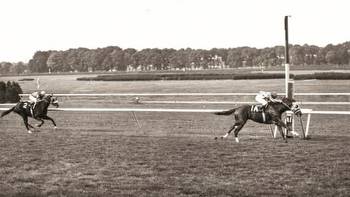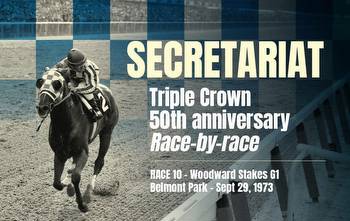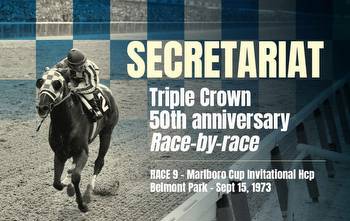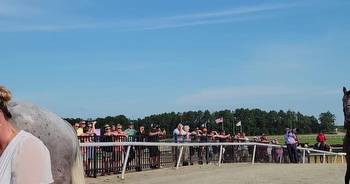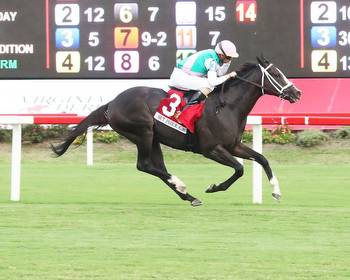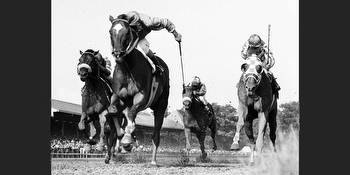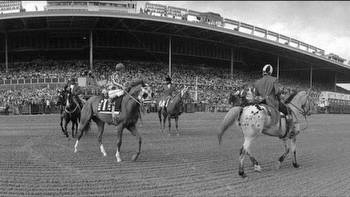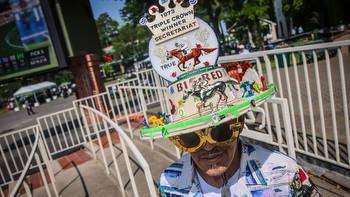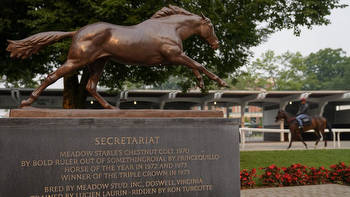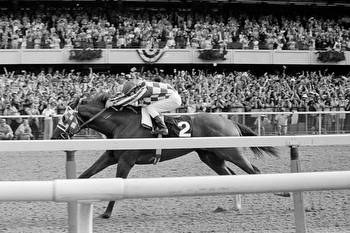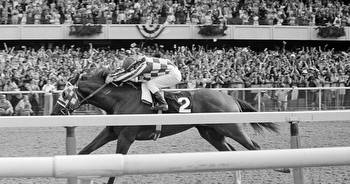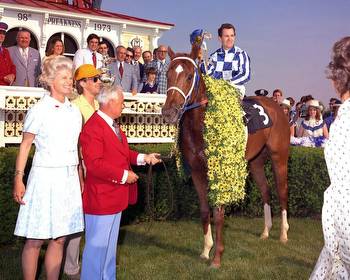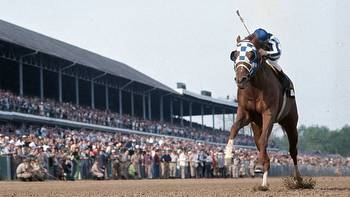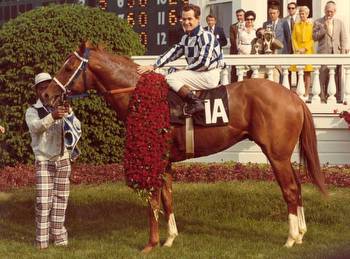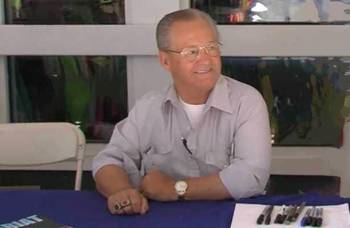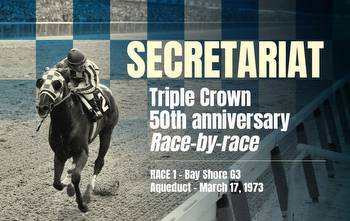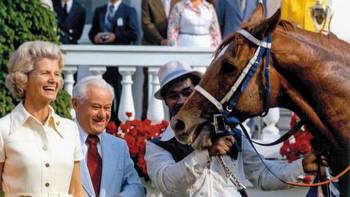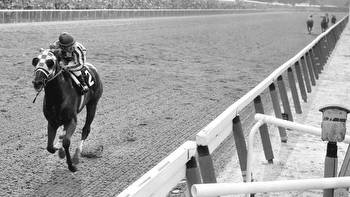Chicago history: Secretariat steals show in 1973 at Arlington Park
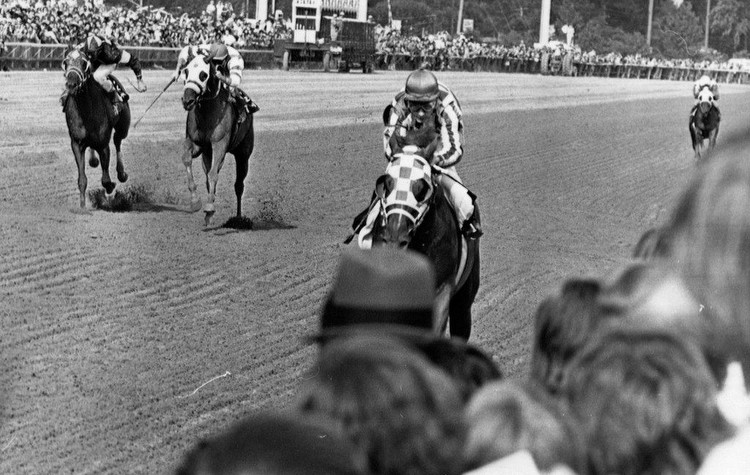
It’s sadly ironic that coinciding with the demolition of Arlington Park this month is the 50th anniversary of a race at the track run by a thoroughbred many acclaim as the greatest in history.
At the height of his career, coming off a monumental victory in the Belmont Stakes that made him the first Triple Crown winner in 25 years, Secretariat raced before a crowd of 41,223 in the custom-made $125,000 Arlington Invitational Stakes on June 30, 1973, and won in a nine-length runaway, missing the track’s 1 1/8-mile record by one-fifth of a second when he crossed the finish line in 1 minute, 47 seconds.
There was win betting only on the four-horse race, and Secretariat paid $2.10, the lowest amount allowed under the Illinois racing statute. The track had to contribute $17,941 to make up for a minus-pool shortfall. The other three horses were linked in the wagering as the field.
“Effortlessly” is how the Tribune’s account of the race in the July 1 editions described the way the resplendent chestnut won.
The story continued: “Unusually slow to leave the gate, Secretariat swept past his three adversaries by the time they swung into the first turn. In less than 1/4th of a mile he assumed command with a rush — while jockey Ron Turcotte was almost standing up in the saddle.
“At the outset, Our Native and Blue Chip Dan ricocheted off one another as if they were bowling pins. Leslie Ahrens on Blue Chip Dan had to take up sharply lest he clip My Gallant’s heels. The chain reaction forced My Gallant perilously close to Secretariat. Yet the Triple Crown winner did not deviate from his course. He wanted the lead and he was going to get it.
“And after the son of Bold Ruler-Somethingroyal, by Princiquello, went to the lead, catching him became the impossible dream. ‘I could have broken the record if I wanted,’ said Turcotte, who has not even had to flick his whip in Secretariat’s last three races. ‘The horse was not quite on his feet when the gate was sprung. Rather than rush him I let him settle himself. I kept him 10-12 feet off the rail all the way.'”
It was the 13th triumph in 16 starts for Secretariat, and his share of the $125,000 purse was $75,000. But that was chump change for the 3-year-old colt. Based on his potential portended by his performances as a 2-year-old to become the long-awaited Triple Crown winner, Secretariat was syndicated for breeding purposes for a then-unprecedented $6,080,000 before his 3-year-old season, making him the richest horse ever to set foot on a racetrack.
Secretariat was the first 2-year-old to be voted Horse of the Year since the annual balloting was inaugurated in 1936.
Secretariat’s quest for the Triple Crown saw him win the Kentucky Derby at Churchill Downs and Preakness at Pimlico in track-record time and the Belmont in North American record time. His 31-length margin of victory in the Belmont is by far the biggest in the Triple Crown races.
Before the Belmont he appeared on the covers of Time, Newsweek and Sports Illustrated, the nation’s foremost weekly magazines at the time.
To represent Secretariat, his owner, Penny Tweedy, hired the William Morris Agency, a firm that numbered among its celebrity clients Elvis Presley and Sophia Loren. She turned down lucrative bids for him to appear on TV shows and a $25,000 offer from a Las Vegas nightclub that called for him to parade around the casino for 15 minutes a day and included room accommodations for a party of four for a week.
Tweedy’s maiden name was Chenery, and she syndicated Secretariat to obtain money to satisfy the enormous tax bill that arose for her and two siblings after the death of their father, Christopher Chenery, in January 1973, five years after she took over management of his Meadow Stable racing and breeding operation headquartered in Virginia. She divorced her husband of 25 years, John Tweedy, in 1974, married Lennart Ringquist in 1976 and divorced him in 1980.
A couple of years before arranging the unconventional syndication, Tweedy made two other major moves, hiring Roger Laurin to be her trainer and then hiring his father, Lucien Laurin, to replace him when Roger accepted an offer to become the trainer for the Phipps family’s stable, which was one of the most renowned in racing.
After the Belmont, tracks from coast to coast clamored to entice Tweedy to bring Secretariat to their tracks for a race.
What was the secret of Arlington’s success in landing horse racing’s answer to Babe Ruth?
Long after the race Arlington’s longtime general manager, Bill Thayer, one of the best-connected individuals in American racing, revealed the inside story.
According to Thayer, who died in 2015, sometime in the early 1970s he got a call from Lucien Laurin in New York. Laurin said some relatives from the Joliet area wanted to go to the track and asked Thayer if he could leave some passes.
Thayer not only left the passes, he welcomed the people at the admissions gate, took them to the Classic Club for complimentary lunch and drinks and showed them around the track.
Then he forgot all about it — until he called Laurin after the Belmont to make a pitch for Secretariat to come to Arlington.
“I never thanked you for how nice you were to my relatives that day they came to the track,” Laurin told Thayer, who was caught by surprise. “Now I have a chance to do something for you. I told Mrs. Tweedy you needed a lift at Arlington and we should go there and she agreed to it.”
On June 19, Arlington announced that Secretariat would be coming for an invitational race on June 30.
Invitations also were extended to Linda’s Chief, a winner of multiple stakes races who had come from New York to score an impressive victory in the $117,200 Pontiac Grand Prix at the track four days earlier, and Arlington-based Our Native, winner of the Ohio Derby and Flamingo and the third-place finisher in the Kentucky Derby and Preakness. Secretariat would carry 126 pounds, and Linda’s Chief and Our Native each would carry 120.
The week of the Pontiac Grand Prix, the owner and breeder of Linda’s Chief, Neil Hellman, steadfastly denied that he was ducking Secretariat when he refused to run his talented colt in the Triple Crown races.
“We’d like to meet Secretariat for sure, but at a mile and an eighth — not his distance,” Hellman boasted to a group of reporters.
But no sooner than the 1 1/8-mile race was announced, Hellman claimed he’d been misquoted and wouldn’t be coming unless the distance was shortened to 1 1/16 miles. It was a curious comment in view of the fact Hellman had expressed fears over the 1 1/16-mile Grand Prix route because the starting gate was positioned immediately before the first turn at that distance.
With Linda’s Chief a no-show, Chicago owner Phil Teinowitz said he would accept the invitation extended to his colt Blue Chip Dan, who had run an impressive second in the Pontiac Grand Prix as a 61-1 long shot, to serve as a pinch runner. Also accepting a belated invitation was Arthur Appleton, the Northbrook owner of My Gallant, who after winning the Blue Grass Stakes finished an injured ninth in the Kentucky Derby and was third in the Belmont.
Even though the horse considered Secretariat’s most competitive adversary was going to be conspicuous by his absence, there was a groundswell of excitement as the race approached. A woman phoned Arlington two days before the invitational to say she was postponing her wedding for one week so she and her fiance could attend.
A Tribune headline atop the story of the post-position draw, alluding to the perceived invincibility of Secretariat, read: “‘Act of God’ needed in Arlington race.” Perhaps in anticipation of a miracle, on race day two nuns came from their motherhouse in South Bend, Ind.
The crowd spilled into the track’s infield, and when Secretariat left the second stall in Barn 30 to be saddled in the paddock, fans stood five deep around the fence to see the mighty chestnut specimen nicknamed Big Red.
“When it came to describing how Secretariat excited yesterday’s youth-sprinkled Arlington crowd of 41,223, words fail,” Dave Condon wrote in his July 1 Wake of the News column in the Tribune. “You can’t embellish superlatives.”
“Secretariat was treated as a conquering hero by Arlington officials and fans … and he responded magnificently,” fellow columnist Rick Talley wrote.
If the Bears build that state-of-the-art football stadium at Arlington, lurking on what used to be the racetrack will be The Galloping Ghost — but it won’t be the ghost of Red Grange.
It will be the ghost of Big Red, the super horse named Secretariat, who left Chicagoland sports fans spellbound 50 years ago.
Neil Milbert is a freelance reporter for the Chicago Tribune.


